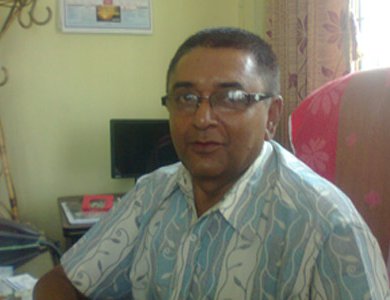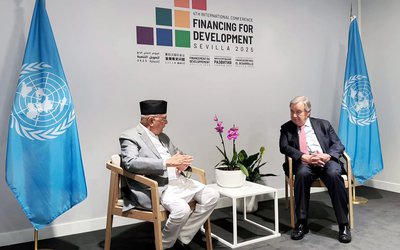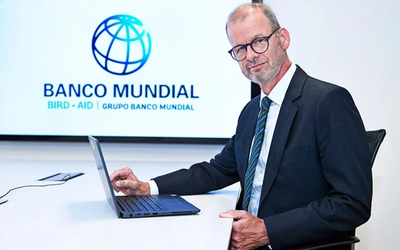
Although the Interim Constitution guarantees the right to information as a fundamental right of Nepalese citizens and the Right to Information Act and Regulation has already been made to provide information to the citizens, a large number of people are yet to gain access to information they require.
At a time when there are growing incidents of impunity and corruption at various development ministries, a free flow of information is necessary to prevent them. Experts argue that Right to Information (RTI) is crucial for promoting overall human rights.
Established under a legal provision of Right to Information Act, National Information Commission is there to monitor and implement the Act. But it lacks the institutional mechanism as well as capability to fulfill its institutional role.
Citizens theoretically have the right to access information held by public authorities, including all government organizations at national and local level to non-governmental organizations, political parties and any other body of public importance.
All the information held by public bodies should be subject to disclosure unless there is an overriding public interest justification for non-disclosure. According to RTI Act 2007, the government needs to provide all necessary information sought by citizens. It was recognized in Article 27 of the 2007 Interim Constitution also.
Although the National Information Commission was established in 2008 as an independent body to oversee the implementation of RTI Act, it still lacks the institutional capability. The commission formulated RTI Regulations in 2009 to protect, promote and implement RTI law.
The Commission is empowered to hear and adjudicate cases under RTI law and has power to issue orders to public agencies recommending and providing suggestions in RTI to public bodies and government. The commission can also impose fine, compensations, issue orders, prescribes timeframe to public bodies to provide information.
Although it is an all powerful body, its institutional capability is virtually non-existent. According NIC, it is still under staffed and under resourced. It does not have the manpower to update its website with relevant information and to establish a proper record keeping system as NIC staff are not experts on RTI.
Keeping this in view, the RTI project is now attached with NIC. Supported by DFID-ESP, one of the aims of the Project is to improve the Implementation of RTI and to help NIC improve its performance for an increased demand for information. It aims to increase knowledge and awareness of public bodies and improve the performance of public information officers ( PIOs).
It will support to build broader coalition and ownership amongst all key stakeholders. The Project will aim to make public bodies more responsive, transparent and accountable towards the demand of citizens.
The pilot covers Ministry of Federal Affairs and Local Development, Ministry of Education, Ministry of Health, Ministry of Agriculture, Ministry of Urban Development, Ministry of Physical Planning, Works and Transport Management and their line agencies in Dadeldhura, Banke, Morang, Parsa and Kaski.
RTI project will also strengthen NIC staff and its institutional capacity, help Public Information Officers – improve their capacity, help Public Bodies – strengthen their institutional capacity and spread awareness through the Civil Society.
The information demand by citizens increased in six selected ministries and their local agencies: for Establishment of MIS system to manage information request, Familiarization training to PIOs on MIS system, and Public awareness on MIS and application request.
Integrated MIS system was established in six pilot ministries and their district line agencies in five districts to maintain record of information request and its status.
RTI Pilot Underway: Pokharel
Madhav Prasad Pokharel, Undersecretary and chief-Appeal Section and spokesperson at National Information Commission, is leading the RTI project. Pokharel spoke to New Spotlight on issues related to the access to information.
What is the state of Right to Information?
It is guaranteed by the Interim Constitution and backed by Right to Information Act. The commission is now making efforts to create institutions to provide the information the citizen needs. We are now in the process to establish Right to Information Center in five different places to make it easy to access information.
Do you have centers all over Nepal?
We are yet to reach all over Nepal. Although the law has made a mandatory provision to provide the information sought by citizen, there are still a lot of hindrances on it. Even the Commission does not have all documents. People are unaware of their rights. Some NGOs have been working to disseminate the Right to Information. However, they are also confined to district headquarters.
What is the RTI project doing now?
One of the aims of this pilot project is to make effective arrangements to strengthen the Right to Information system. For this, we are now currently working to establish Management Information System (MIS) in five districts to provide relevant information of six development related ministries. They will be established in Morang, Parsa, Pokhara, Banke and Dadeldhura districts of five development regions.
How will it work?
We will implement MIS system in all these districts linking the offices of six development related ministries. According to the act, there is the need to release all the information within three months. After installing the information in MIS, people will get the information they want.
As there are so many acts which still seek to maintain secrecy in the disseminating information, how can this be handled?
Yes, there are certain acts which contravene with the existing Right to Information Act.
Who is supporting the project?
DFID-ESP is funding our pilot project. It is going to be a five-year project. During the period, the commission will make several efforts. We have planned to reach up to the secretaries of Village Development Committees. We are now developing Outreach and Communication Strategies.
- MELAMCHI WATER SUPPLY: No Interruption During Monsoon
- Jun 25, 2025
- KOREAN RETURNEES: Successful Integration
- Jun 25, 2025
- UPPER TRISHULI-1: Engaging With Local
- Jun 25, 2025
- IME GROUP: Twenty Five Years Of Journey
- Jun 24, 2025
- NEPAL’S AIR POLLUTION: A Growing Health Concern
- Jun 24, 2025















